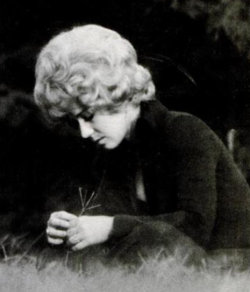Sammi Smith
| Sammi Smith | |
|---|---|

Sammi Smith in 1970
|
|
| Background information | |
| Birth name | Jewel Faye Smith |
| Born |
August 5, 1943 Orange County, California, U.S. |
| Died | February 12, 2005 (aged 61) Oklahoma City, Oklahoma, U.S. |
| Genres | Country, outlaw country, country pop |
| Occupation(s) | singer, songwriter |
| Years active | 1968–2005 |
| Labels | Columbia, Mega, Elektra, Cyclone Records |
| Associated acts | Waylon Jennings, Willie Nelson, Jessi Colter |
Sammi Smith (August 5, 1943 – February 12, 2005) was an American country music singer and songwriter. Born Jewel Faye Smith, she is best known for her 1971 country-pop crossover hit "Help Me Make It Through the Night", which was written by Kris Kristofferson. She became one of the few women in the outlaw country movement during the 1970s.
Sammi Smith was born in Orange County, California, in 1943 but spent her childhood in Oklahoma, Texas, Arizona and Colorado. She dropped out of school at the age of eleven and began to sing professionally in nightclubs. She was only fifteen when she married Steel Guitar Hall of Fame and Night Club Operator Bobby White. They had three children. She had her first divorce in 1966. She would eventually have two more marriages. In 1967 Johnny Cash's bass player Marshall Grant discovered her singing in the Someplace Else Night Club in downtown Oklahoma City. After Grant's discovery she moved to Nashville, Tennessee. When Johnny Cash learned of her talent, he helped her get signed with Columbia Records. Her first minor country hit was in 1968, titled "So Long, Charlie Brown, Don't Look for Me Around". The song showed Smith's potential as a country music powerhouse. In 1971 she married her second husband, Willie Nelson's guitarist Jody Payne. They had one child, singer/actor/musician Waylon Payne, whose godfather is country legend Waylon Jennings.
"Help Me Make It Through the Night" was Sammi Smith's career hit and the one that made her famous. She had been one of the rare women in the "outlaw country" movement sweeping country music in the 1970s. At this time, country was moving in two directions: "outlaw" and a more mainstream pop sound. However, "outlaw country" would be short-lived, with country taking on a distinctly pop cast by the end of the '70s. Smith would still remain with the "outlaw" sound throughout the 1970s.
...
Wikipedia
